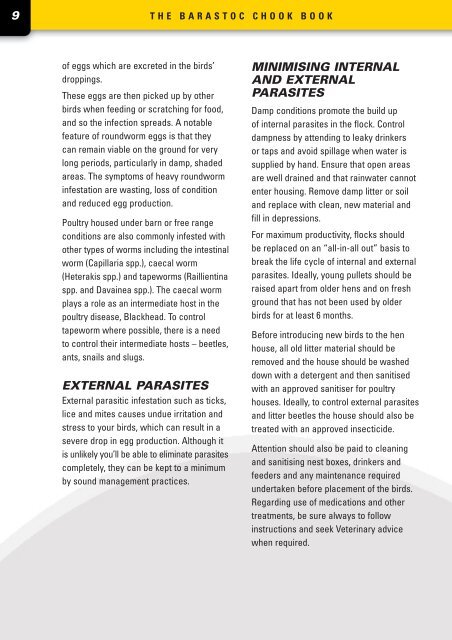THE CHOOK BOOK - Ridley Corporation
THE CHOOK BOOK - Ridley Corporation
THE CHOOK BOOK - Ridley Corporation
Create successful ePaper yourself
Turn your PDF publications into a flip-book with our unique Google optimized e-Paper software.
9 <strong>THE</strong> BARASTOC <strong>CHOOK</strong> <strong>BOOK</strong> <strong>THE</strong> BARASTOC <strong>CHOOK</strong> <strong>BOOK</strong><br />
10<br />
of eggs which are excreted in the birds’<br />
droppings.<br />
These eggs are then picked up by other<br />
birds when feeding or scratching for food,<br />
and so the infection spreads. A notable<br />
feature of roundworm eggs is that they<br />
can remain viable on the ground for very<br />
long periods, particularly in damp, shaded<br />
areas. The symptoms of heavy roundworm<br />
infestation are wasting, loss of condition<br />
and reduced egg production.<br />
Poultry housed under barn or free range<br />
conditions are also commonly infested with<br />
other types of worms including the intestinal<br />
worm (Capillaria spp.), caecal worm<br />
(Heterakis spp.) and tapeworms (Raillientina<br />
spp. and Davainea spp.). The caecal worm<br />
plays a role as an intermediate host in the<br />
poultry disease, Blackhead. To control<br />
tapeworm where possible, there is a need<br />
to control their intermediate hosts – beetles,<br />
ants, snails and slugs.<br />
EXTERNAL PARASITES<br />
External parasitic infestation such as ticks,<br />
lice and mites causes undue irritation and<br />
stress to your birds, which can result in a<br />
severe drop in egg production. Although it<br />
is unlikely you’ll be able to eliminate parasites<br />
completely, they can be kept to a minimum<br />
by sound management practices.<br />
MINIMISING INTERNAL<br />
AND EXTERNAL<br />
PARASITES<br />
Damp conditions promote the build up<br />
of internal parasites in the flock. Control<br />
dampness by attending to leaky drinkers<br />
or taps and avoid spillage when water is<br />
supplied by hand. Ensure that open areas<br />
are well drained and that rainwater cannot<br />
enter housing. Remove damp litter or soil<br />
and replace with clean, new material and<br />
fill in depressions.<br />
For maximum productivity, flocks should<br />
be replaced on an “all-in-all out” basis to<br />
break the life cycle of internal and external<br />
parasites. Ideally, young pullets should be<br />
raised apart from older hens and on fresh<br />
ground that has not been used by older<br />
birds for at least 6 months.<br />
Before introducing new birds to the hen<br />
house, all old litter material should be<br />
removed and the house should be washed<br />
down with a detergent and then sanitised<br />
with an approved sanitiser for poultry<br />
houses. Ideally, to control external parasites<br />
and litter beetles the house should also be<br />
treated with an approved insecticide.<br />
Attention should also be paid to cleaning<br />
and sanitising nest boxes, drinkers and<br />
feeders and any maintenance required<br />
undertaken before placement of the birds.<br />
Regarding use of medications and other<br />
treatments, be sure always to follow<br />
instructions and seek Veterinary advice<br />
when required.<br />
VIRAL AND BACTERIAL<br />
INFECTIONS<br />
Birds are prone to a number of viral and<br />
bacterial infections. Some cause minor<br />
effects to health and productivity whilst<br />
others can result in a high level of mortality<br />
or potentially threaten the poultry industry<br />
in Australia.<br />
For poultry flocks above a certain size<br />
(around 500 to 1,000) it is compulsory in a<br />
number of Australian states to vaccinate<br />
your layers for Newcastle disease virus<br />
Check with your Department of Agriculture<br />
or Primary Industries for advice. It is vital<br />
that you report to your local government<br />
department or Veterinarian any unusual<br />
mortalities or clinical signs of disease in<br />
your poultry flock. Ask your bird supplier<br />
about their vaccination schedule and<br />
contact your Veterinarian to discuss any<br />
concerns you may have regarding the<br />
health of your flock.<br />
EGG EATING<br />
Laying hens are naturally inclined to eat<br />
broken eggs – this is not caused by a feed<br />
deficiency. At times this trait develops into<br />
a vice whereby a hen pecks at eggs to<br />
break and eat them.<br />
Once this habit starts it is difficult to break<br />
and will of course result in serious egg<br />
losses and may also lead to cannibalism.<br />
It is best to prevent egg eating from starting<br />
with good management, such as providing<br />
plenty of litter in nests, prompt removal of<br />
broken eggs and collecting eggs twice a day.<br />
FEA<strong>THE</strong>R PICKING AND<br />
CANNIBALISM<br />
This vice usually results from overcrowding,<br />
lack of drinking and feeding space, idleness<br />
and poor conditions. Any birds that have<br />
been vent picked, traumatised by other<br />
hens or are showing signs of poor health<br />
and debilitation should be immediately<br />
culled in a humane manner.<br />
Seek advice from your Veterinarian or<br />
State Department of Agriculture or Primary<br />
Industries regarding appropriate culling<br />
methods. If it is neglected it may develop<br />
into the nastier vice of cannibalism. Again,<br />
once it starts it is very difficult to stop.<br />
The primary task is to keep the birds<br />
occupied. Assuming your hens are well<br />
housed with adequate space, this can be<br />
done by scattering straw or feed over the<br />
ground for them to scratch around.<br />
BROODINESS<br />
This is a natural, maternal instinct that can<br />
cause decreased egg production. Broody<br />
hens occupy the nest for extended periods<br />
of time, thereby preventing other hens


